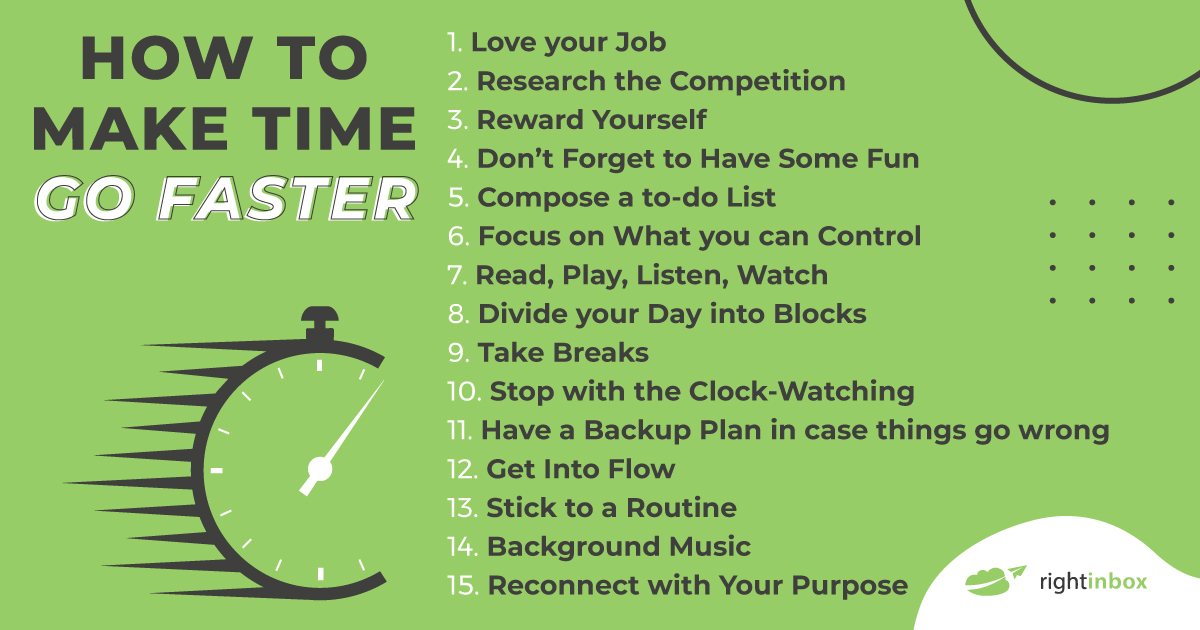Tick tock, tick tock. You’ve been clock-watching and time is dragging. You waste a few minutes thinking about how to make the day go faster. If you can’t relate to that, you’re lucky. If you can, fret not. There are plenty of ways to stop the hours crawling. Not just at work, but anytime.
It’s estimated that between 30 and 90 percent of American adults experience boredom at some point in their daily lives.
If it’s not tedium, other factors may be involved. Are you working on a particularly taxing project? Or are you looking forward to meeting friends later on? Maybe you’re waiting on some important news. Whatever the reason, there are things you can do to help make the day fly by.
How to make time go faster; read on for an eclectic range of methods:

1. Love your Job
A third of your life will be spent at work. That’s a substantial amount of your existence. So ideally, choose a profession you like. An exciting role that you look forward to.
If you’re enthusiastic about what you do, the days will whizz by.
But it’s not the position alone that determines how much you enjoy your job. There are other factors to keep in mind. For example, your working environment. Do you like your office? How about your colleagues?
Surround yourself with people you admire, like, and can learn from. Make sure your workstation is a space that makes you smile. Decorate it with pictures of friends and family and colorful pens – whatever works for you.
Check out presentations hosted by other departments to acquire a broader overview of the organization. Be flexible in terms of where you work. If you’re fed up with your current spot, why not move to a new location? That’s especially easy if you work from home. Change rooms or head to a coworking space for a few days a week. Or as simple as taking movement breaks from time to time, stretch and do a bit of exercise to reset yourself.
A happy worker equals a speedier workday.
Additional Reading: 30 Best Gmail Extensions for 2024
2. Research the Competition
Let’s face it, we usually have a little bit of free time during the working week. Spare minutes between tasks or projects. Use these moments to check out your business rivals. What have they been working on? How’s their website looking?
If you notice their operation has grown over the last year or so, try to figure out how they’ve achieved that. Have they scaled efficiently? Are there any tips you can take away with you?
Spending an hour doing a bit of investigative work can help the creative juices flow. You may even come up with new ideas.
3. Reward Yourself
You’ve ticked off all of your monthly goals. So treat yourself.
For instance, if your newly implemented sales process paid dividends this week, do something nice for yourself. That can be as simple as buying your favorite chocolate bar to enjoy with a cup of coffee.
Reward your staff, too. If a member of your team has done a first-rate job on a particular task, be sure to let them know. And come up with some inventive employee recognition ideas.
Confidence will increase, as well as job satisfaction.
4. Don’t forget to have some fun
You know the good old saying; time flies when you’re having fun.
It’s unrealistic to expect every day to be 100% entertaining, but you can try and inject as much joy as you can. Arranging to meet with friends is something to look forward to. Going to a concert with your partner ticks that box, too. Go for a meal, a cocktail or two, listen to some comedy.
5. Compose a to-do list
Time can go by at a snail’s pace if you don’t feel like you’re making progress or achieving anything. So create a schedule.
What are your goals for the day and the week? For example, you own an eCommerce business and have a small customer service team that uses a multi-line phone system. You’re concerned their telephone handling skills may need some work. One of your objectives for the day may be to consider investing in a call recording service. That way, you can analyze their interactions.
Linked to that, a second target may be to investigate Voice over Internet Protocol (VoIP). How does VoIP work? Can it improve your organization’s productivity?
You also want to work on your employee’s email productivity. An aim for this time next week may be to research how Gmail labeling could help.

6. Focus on what you can control
There are certain things you have control over, others are beyond your powers. Thoughts, emotions, and actions fall within your remit.
Events, how others react to something you do, and people’s judgments of you are, things you can do nothing about. Remember that.
Control what you can. For example, how about upskilling and unlocking your potential?
If you lose out on a client to a competitor, that’s their choice. You may be angry, disappointed, or bemused. You could blame yourself or your colleagues. But in reality, the result is the same. The customer has still gone elsewhere.
So, what do you have control over in a situation like that? Are there any steps you can take to win them back? If not, use the circumstances to analyze and learn.
Take responsibility for your life and work.
7. Read, play, listen, watch
Pick up that book you’ve been meaning to get lost in. Play the vinyl you bought last week. Listen to the latest episode of your favorite podcast. Escape with a Netflix series.
Re-energize and refocus.
Take some time out for yourself, but also invest a few hours in work-related activities. Not your day-to-day duties, but research. For example, you’re in the market for a new teleconferencing tool. Browse the internet and read up on the solutions that are out there. It may be the case that a free conference call app is the best system for you.
8. Divide your day into blocks
Use the Pomodoro. Hang on, but that’s a tomato, isn’t it? It’s also a time management technique that uses a timer to break work down into intervals. Each is 25 minutes long, with short 5-minute breaks in-between.
Every 300-second downtime is long enough to make a snack, a drink, or to do a quick yoga routine. Listen to a song or two, or even check your social media accounts.
If that’s not your thing, research other systems. Or create your own by sectioning your time into periods that suit you. An hour, or 45 minutes. Then stop and do something else.
For instance, you work in IT and are tasked with increasing efficiency. Dedicate the first chunk of your day to researching mobile device management.Then, move onto something else.
Focus is maintained, procrastination is minimized, and productivity is maximized.
9. Take breaks
The last ‘how to make time go faster’ method may not work for you. Regardless, make sure you take regular recesses.
For example, you’ve been at your desk since 8am trying to figure out how to recover an email you accidentally deleted. Your head feels fuzzy. Pause for a few minutes to clear your mind.
Have a chat with a colleague about something unrelated to work. Take an hour for lunch. And don’t just sit at your desk and eat, get some fresh air, go for a walk, or arrange to meet a friend.
Giving yourself that time away from the task at hand will work wonders. Stress levels will fall, and you’ll also build relationships with your fellow workers.
10. Stop with the clock-watching
Keeping a constant eye on the time is not helpful. Yes, it’s easy to find yourself monitoring the minutes, but it’s not productive.
Divert your attention and throw yourself into your work.
If you haven’t got anything to do, find something. Ask your boss if there are additional responsibilities you can take on. Or if there’s training you can sign up for.
Outside of the office, you could take up a new hobby. Try a new form of exercise, or bake that cake you’ve had your eye on.
When asked “What are your hobbies and interests?”, 54% of Americans surveyed said music, 40% responded with pets, and 31% answered arts and crafts. Food for thought.
11. Have a backup plan in case things go wrong
Situations don’t always go as anticipated, even if you’ve meticulously thought things through. Despite being prepared, sometimes things happen beyond your control.
For instance, let’s say you and your team work remotely. What do you do if your virtual project management tools fail mid-meeting? Make sure you have an alternative means of communicating.
And if that’s a recurring problem, perhaps it’s time to change systems. Research the best video conferencing app and make the switch. That will help avoid enforced hiatuses within your working day.
12. Get Into Flow
One way to make time go faster is to get into “flow.” A flow state can also be called other things like “in the zone.” But ultimately, when you’re in flow it means that you’re fully immersed in the current moment or task.
As such, when you’re in flow, you don’t even pay attention to time. It passes right by. There are a few great ways to achieve flow. The first is to make sure you are doing things that are interesting to you, while still being challenging. Another great way to achieve flow is to avoid switching back and forth between activities — that way you don’t lose focus.
13. Stick to a Routine
Picking up where the previous tip left off, you don’t want to hop back and forth between various tasks. That’s because there is a mental “cost” associated with this. And it can make time seem slower when you’re flailing around without a routine.
When you “task switch,” it actually uses more brain power and willpower than when you’re simply doing one thing at a time for extended periods. Thus, you should aim to schedule your day to where you have larger, longer blocks of time for each activity. Sticking to a daily routine can help with this tremendously.

14. Background Music
Have you ever put your favorite album on while cleaning, or while driving? It makes hours seem like minutes. The same concept applies with anything, whether working or relaxing.
The right music can occupy your mind. That means it’s subconsciously paying attention to the beat, rhythm, vocals, and melodies of the music instead of obsessing over the numbers on your watch or clock.
That being said, faster music with a more consistent rhythm will help time move along better than a slow beat. But any music at all is better than nothing if you’re hoping to speed up the perceived passage of time.
15. Reconnect with Your Purpose
Take a moment over a weekend, afternoon, or morning, to really reconnect with your “Why.” What is driving you throughout the day? What are your dreams and goals?
Where do you want to be in 1 year, 5 years, 10 years? When you realign yourself with your purpose, it gives you a renewed sense of urgency. And all of the sudden, time starts to speed up. The reason is you will be much more focused on the bigger outcome of our actions, rather than the time it takes.
16. Get It Out Of Your Head
One of the biggest problems we have is keeping everything inside. Your mind is an excellent tool for planning, creating, and being emotionally present. However, oftentimes the time on the wall goes so slowly because we’re being too logical.
To free up some of your brainpower to enjoy the moment and not watch the clock, practice getting things out of your head. Keep a notebook nearby, or other device to capture ideas, tasks, and even worries.
17. Tick Off The Boxes
As you go through your day, make the habit of checking boxes off your list of to-do’s. Make it official. If you have a paper list, check it with your pen. If you have a digital list, bold or otherwise mark your done tasks.
This mentally makes you feel like things are moving along. Contrast this to associating everything as one giant task, which could feel like it’s taking “all day.”
18. Remind Yourself Of Priorities
Everyone has priorities in their life. And you shouldn’t be afraid to be proud of yours. There are some days when it feels like you’re waiting and not doing anything important.
Especially on these days, it’s important to remember what truly counts. What gets you up and about in the morning? What excites you? That will speed up your mind, your body, and your soul — speeding up time as well.
19. Focus On Others
A great way to make time speed up is to take focus off yourself and your immediate environment. If you focus on others, your mind expands into a new space. Since you’re occupying your mind, time doesn’t move as slowly as it did.
20. Go Slow To Go Fast
Going fast is not the right way to make time go faster. You might find yourself getting 5x done in 20 minutes just to realize that only a little bit of time has passed. Compared with a steady, slow pace, it’s night and day.
21. Sleep
Your perception of time could be warped by a lack of sleep. If you think you’re feeling stress or impatience from poor sleeping habits, make a change. It’s never too late to start gaining back some of that sleep debt.
22. Talk To A Loved One
Isn’t it funny how you can spend hours talking to a loved one and it seems like almost no time has passed? There’s some magic in that. So if you have a relative, significant other, or close friend to chat with, give them a ring.
Why Time Feels Slow
To really discover ways to effectively speed up time, we have to go to the root of the issue. Why does time feel slow to begin with? Usually, it happens for one of the following reasons:
1. Where Attention Goes, Energy Flows: If you’re constantly looking at the time, where is all your energy and focus going to go? That’s right, it’s going to go towards time. Remember the saying that “a watched pot never boils.” Human nature tells us that if you want to pass time quickly, put your attention on other things.
2. Lack of Excitement: One very common reason for the perceived slowness of time is a lack of engagement in your day. If you aren’t introducing yourself to something new or exciting, it’s tempting to count the hours. Psychologist William James once wrote when your day is complete with “excitement” it passes quickly, but in contrast, a day spent waiting for an “unsatisfied desire for change, will seem a small eternity.”
3. No Consistency: When the mind has a certain routine, it doesn’t have to think as much. Therefore, each moment is much easier to process and does not take a lot of mental computing. The end result is the faster passage of time. However, when your mind is not engaged with familiarity, it has to use a lot of thought power. This stretches each minute and hour out longer since more thoughts are actually being created.
4. Lack of Sensory Acuity: If you have taken a substance that dulls the senses, it can make time distorted. This includes drugs, alcohol, and other mind-altering consumables. Keep in mind that your biology affects all perception, since taste, touch, hearing, smell, and even thought are connected.
How to Make Time Go Faster in 2024
Gazing out the window, you’d do anything to be outdoors and away from your desk. What should you do?
Quit? Skive and head outside?
No. Implement some ‘how to make time go faster’ techniques; the days will no longer drag, but fly by. Good luck!
Track emails, email reminders & templates in Gmail for free
Upgrade Gmail with the features it’s missing
Add to Gmail



